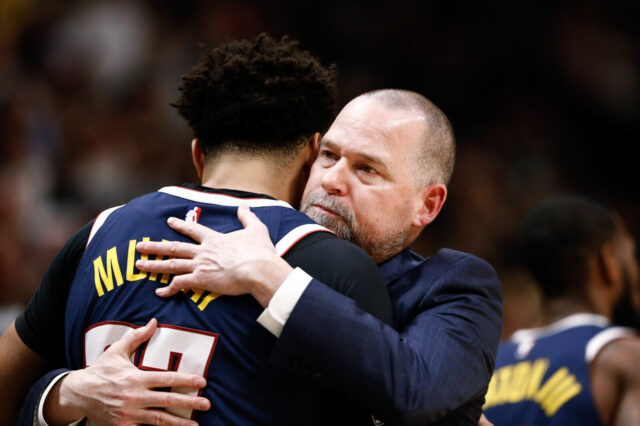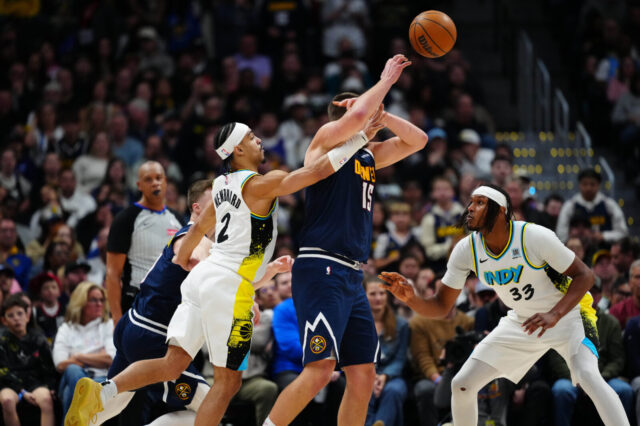The 2021-2022 Denver Nuggets season was a turbulent ride. The start of the season brimmed with the hope of what the end of the season would look like with a healthy Jamal Murray. Denver got off to a scorching hot start on defense but struggled on offense. They held 10 of their first 13 opponents to under 100, but following that streak they would lose six in a row including the loss of their sharpshooter Michael Porter Jr.
After November, the Nuggets searched for their identity through a string of inconsistencies. During a stretch ending in late January, they only tallied one three-game winning streak but they avoided any three-game losing streaks. Their schedule consisted of one win followed by a loss, then two wins followed by two losses, and so on.
They would go on to record two five game-winning streaks towards the end of the season, including their season-best six-game winning streak. That would eventually catapult them into capturing the 6th seed in the West and a postseason matchup with the Golden State Warriors.
The Warriors sent the Nuggets home in five games as Denver could only land one win, but considering Denver’s circumstances, this season was far from a failure. Nikola Jokic is expected to win MVP once again, and the Nuggets displayed fortitude throughout the regular and postseason. When you analyze their statistics at the season's end, there are areas of extreme positivity blended with severe weakness, but that notion does reveal the story of the 2021-2022 Denver Nuggets. A team that overachieved despite misfortunes, but ultimately failed to reach their goal due to glaring weaknesses.
Regular season
Offense
The Nuggets ended the season as the 10th best soring unit. They averaged 112.7 PPG, which was about three PPG behind the Minnesota Timberwolves who captured the top spot. The Nuggets also held the 6th best offensive rating at 113.8, and their points in the paint aided that figure. They scored 49.3 PPG in the paint which also ranked 6th in the league.
Denver’s best attribute might have been their efficiency from the floor. They ranked as the second-best team in FG% at 48.3%, which was only 0.2 points behind the Phoenix Suns. They led the league in effective field goal percentage (55.6%) and true shooting percentage (59%).
Another area of strength was their assists numbers. They graded 3rd with 27.8 assists per game as they only sat behind the Hornets and Spurs in that category. Their assist percentage rated second at 66.7%, and their assist ratio led the league at 20.
Three-point shooting could be characterized as an area of weakness. Michael Malone and the coaching staff wanted the Nuggets to be more of a high-volume shooting team compared to past years, which did materialize but not by much. During the 2020-2021 season, they shot 34.2 3PA per game, and they increased that this year to 35.9, ranking them 13th in the NBA. They stayed in the middle of the pack in 3P% as well as they ranked 16th on 35.3% from deep.
Rebounding and turnovers were two key weaknesses for Denver this season. Their 44.1 rebounds per game were 17th in the league, and their 9.2 offensive rebounds per game ranked 25th. Those figures did not help their second-chance points as they were 20th in the league with 12.5 second-chance points a game. Considering Denver has a dominant offensive rebounder in Nikola Jokic, it indicates how bad they could have been in those categories without him.
Defense
The defense was clearly Denver’s largest issue. They did not have the perimeter defenders to contain the great guards in the West paired with the absence of a defensive threat inside. They graded 15th in defensive rating and 14th in opponent's PPG at 110.4. They allowed the opponent to shoot 47% from the field on average (21st), and they forced 12.8 turnovers per game which placed them 5th worst in the league.
Denver also struggled with defending without fouling at times. Their 20 personal fouls per game put them bottom 10 in the league, which gave the opponent 21.7 free throw attempts per game. Furthermore, they allowed the opponent to score 17.3 PPG off turnovers (26th), and 12.5 fast break PPG (19th), but the most concerning statistic might have been the opponent's points in the paint. They gave up just a shade under 50 PPG in that category which ranked 24th in the NBA.
With that being said, their defense did have positive aspects to it. They were the best team in preventing second-chance opportunities, and they were 4th in the league in opponent rebounds. They also held their opponent to 11.8 made threes per game on 34.6% from beyond the arc which placed them 10th. That is about as far as it goes for Denver’s defensive strengths this season, but Nikola Jokic’s three game-saving blocks could be included as well.
Playoffs
Offense
Much of the same story continued in the postseason. Denver’s strengths remained on the offensive end while their defense continued to struggle. Among the 16 team playoff field, the Nuggets ranked 4th in scoring with 110 PPG, and they shot the 5th best field goal percentage at 47.6%. Denver sustained good ball movement as the 4th ranked assist team with 25 per game, and their points in the paint translated as well scoring 48 points per game in that area.
Most of their weakness translated as well. They committed 16.4 turnovers per game which was tied for second-worst among the field. Their regular season three-point percentage and postseason percentage were almost identical. They shot 35.7% from deep which is a 0.2% upgrade from the regular season, grading them in the bottom half of the playoff field. Overall, their offensive rating ranked 8th at 113.9, but their net rating was 4th worst at -8.
Defense
Denver allowed 118 points per game which was by far the worst mark of any playoff team. they let the Warriors shoot 51.5% from the field (15th), and 42.2% from three which was also the worst mark among the field. They allowed Golden State to produce great ball movement by granting 28.6 assists per game which was again worst amongst playoff teams. Overall, their defensive rating was 121.9 which was over two points worse than any team in the playoffs.
They did grade in the top half of the field in preventing opponent's paint points as they were tied for 7th with 44.8 points per game. They also avoided Golden State’s fast-break actions. They only allowed 9 fast break points a game which was 5th in that category. Their best mark was keeping the opponent off the offensive glass. They were the second-rated team in opponent offensive rebounds and first overall in opponents rebounds.


